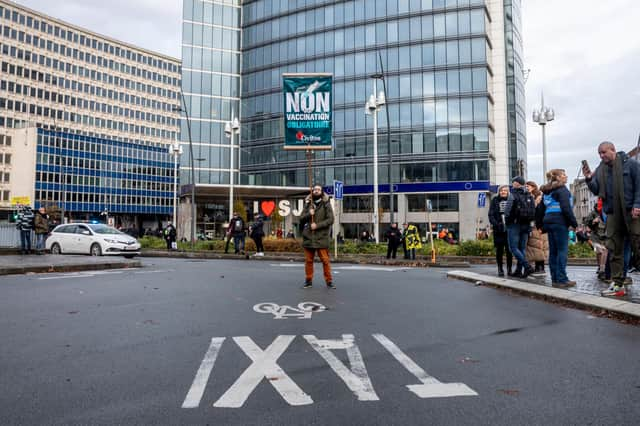Global protests show world leaders are out of touch


It will be different from country to country of course. In the United States the dominant issue is a jury finding a teenager not guilty of murdering two assailants after pleading self-defence. He has been accused of being a white supremacist although those that died were in fact white, with criminal records and intent on setting fire to the car dealership where the accused worked. Seldom has courtroom television provided so effectively the necessary antiseptic of sunlight to a fog of misrepresentation.
In the UK the growing issue is undoubtedly the mounting anger about the daily arrival of trafficked illegal immigrants on the southern shores of our island. This year has seen over 24,500 land on the beaches or be picked up at sea by authorities – a tidy sum for organised crime of nearly £50 million. Already in November a record 5,000 for one month have arrived. No doubt there are some deserving cases, but we are a generous country with existing humanitarian processes for refugees that do not involve payment to cutthroat crooks straight out of Line of Duty.
Advertisement
Hide AdAdvertisement
Hide AdThe Home Secretary Priti Patel, herself the daughter of Indian immigrants from Uganda in the seventies, has endured much criticism for not preventing the incessant landings despite her talk of doing everything possible. Thus Conservative backbenchers have now decided to turn their ire on the Prime Minister, whom by all accounts took a roasting at the backbenchers’ 1922 Committee and is believed to have been less than helpful to Patel’s proposals for action.
The fact every polling company now has the Conservatives behind Labour, with a hung parliament a genuine possibility at the next general election, is forcing those MPs at risk to cut to the chase. Were such polling to persist then a move to replace the Prime Minister is openly being touted, and because it is a party that has dissent in its genes (unlike the SNP, which makes Stalinism look positively cherub-like) an election with Rishi Sunak, Liz Truss or Priti Patel leading the charge for the Government is becoming a worthwhile wager.
Yet for all the domestic issues raising their heads again – and there are so many in Scotland alone I have not presented a list for it would take me to the end of this column – another world-wide phenomenon has the potential to replace concerns about climate change and become internationally dominant. The growing global opposition towards the latest pair of authoritarian jackboots provided by vaccine passports and further lockdowns cannot be ignored. Be they on the left or right foot – and as ever the definitions should more appropriately be about individual versus collective rights – the restrictions being introduced in Austria and offering a contagion to other supposedly liberal Western states are more appropriate for dystopian movies and novels.
In the Netherlands we have seen mass demonstrations against enforced vaccine passports in Rotterdam resulting in the police resorting to live rounds. Three people (by police accounts) have been hospitalised. More demonstrations are expected.
There have been similar manifestations, if not as contentious, in capitals across Europe. We have had well attended demonstrations (strangely not covered by the media) in London, across cities in France, Denmark, Greece, Italy, Georgia – and beyond the continent in Australia, New Zealand, Guadeloupe and elsewhere – and, yes, in Glasgow too.
What this represents is a public that was once willing to go along with what were, on balance, considered necessary sacrifices of liberty to give healthcare systems the chance to create capacity and protocols to cope with the pandemic threat, now losing patience with what appears illogical and openly authoritarian.
There never has been a settled consensus that the nightmare predictions of half a million British deaths was anywhere near realistic. Indeed, such were the contentious claims about the efficacy of the PCR tests, the Scottish Government cover-up around the Nike conference outbreak, the decisions to move untested hospital patients into care homes (continued even longer in Scotland), the mounting questions about the efficacy of the vaccine for those that have very low threat from Covid-19 – that opposition to government restrictions has been welling up.
Despite it not being the previously internationally agreed response to a pandemic the peoples of the world signed-up to the novel idea of lockdowns, even though there were genuine questions that went ignored or unanswered about physical and mental health costs being stored-up for the future; hugely damaging economic consequences especially for the poorest and youngest; and, genuine concerns about liberty and human rights as governments that have introduced what are essentially wartime powers have been reluctant to give them up.
Advertisement
Hide AdAdvertisement
Hide AdInterestingly the EU has had nothing to say about the probable breaches in law, but that is no surprise. Had the jackboots been pulled on in Poland or Hungary it would no doubt have been a different story for the EU Commissioners. Worse, the clearly nationalistic behaviour by the French and German governments in restricting PPE and vaccine movements and the EU’s invoking of Article 16 to put up a Border in Ireland have all shown the EU is not the liberal progressive force its adherents like to think it is.
COP26 is over but globalism is still with us, this time in global protests against world leaders.
Brian Monteith is editor of ThinkScotland.org and previously served in the Scottish and European Parliaments for the Conservative and Brexit Parties respectively.